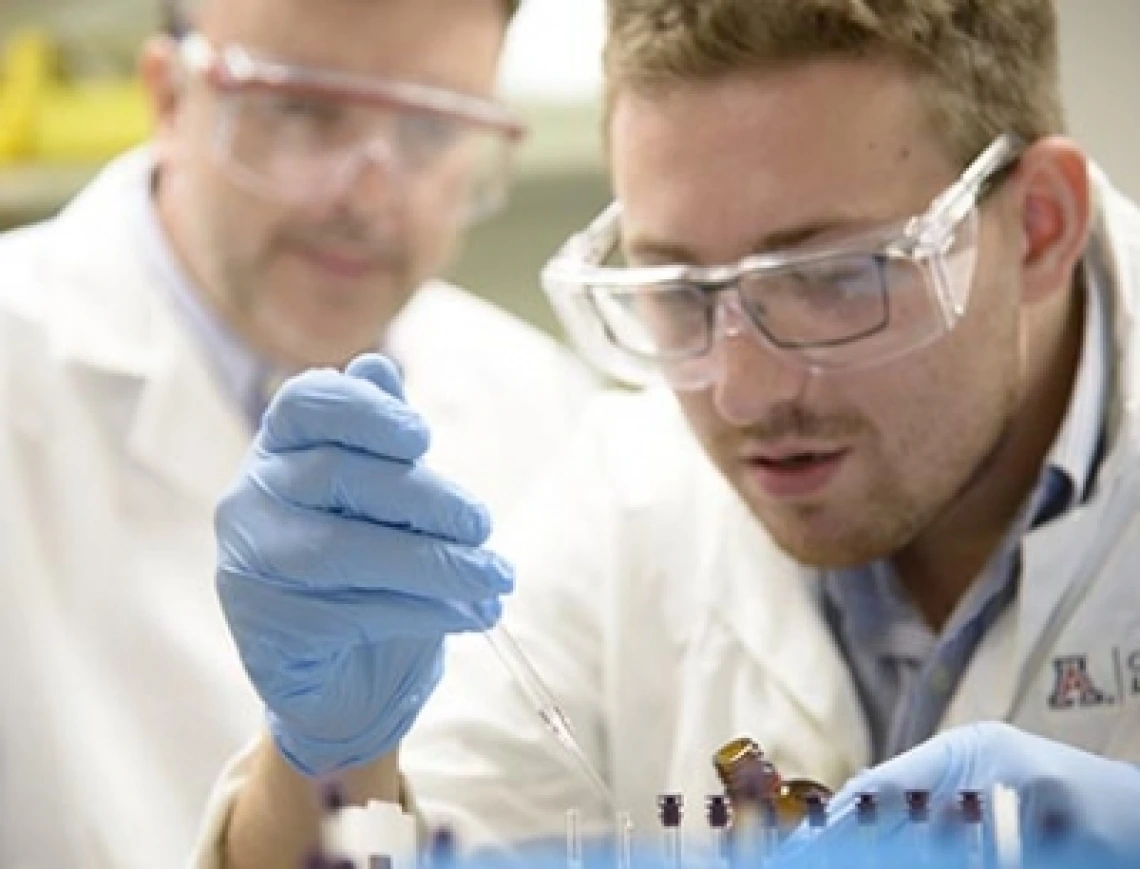UArizona Health Sciences Researchers Narrow in on Novel Treatment for Alzheimer’s Disease
A $3.8-million federal grant will allow a team led by the University of Arizona College of Pharmacy to continue to develop a drug to prevent or reverse this devastating neurodegenerative disorder.

TUCSON, Ariz. – A University of Arizona College of Pharmacy scientist has received $3.8 million in federal funding to continue research to develop medications to help prevent or reverse the progression of Alzheimer’s disease.

Christopher Hulme, PhD, in his lab at the UArizona Skaggs Pharmaceutical Sciences Center (Photo: Noelle Haro-Gomez/University of Arizona Health Sciences)
With no known cure, Alzheimer’s disease affects more than 5.5 million people in the United States. The number of people living with the disease, the most common cause of dementia beyond age 65, doubles every five years, according to the U.S. Centers for Disease Control and Prevention. Estimates indicate the disorder ranks third, behind heart disease and cancer, as a cause of death in older adults.
The NIA/NIH grant allows Dr. Hulme and his team of researchers at the UArizona Health Sciences to continue to develop a treatment to inhibit the activity of certain enzymes in Alzheimer’s patients. One such enzyme is DYRK1A (dual-specificity tyrosine-phosphorylation-regulated kinase-1A), which plays a critical role in the development of neurological pathways in the brain and central nervous system. The enzyme has become an attractive drug target for researchers due to increasing evidence suggesting its overactivity may cause alterations to the brain of Alzheimer’s patients.
“To date, most Alzheimer’s treatments have focused on addressing only one disease symptom at a time, the most common being the appearance of amyloid plaques, proteins that accumulate in the spaces between nerve cells, which, in a healthy brain, normally are broken down and eliminated,” Dr. Hulme said. “However, our unique approach provides an opportunity to intervene in several areas simultaneously by inhibiting the activity of the DYRK1A enzyme.”
Dr. Hulme’s preliminary tests already have shown that blocking DYRK1A causes significant reductions in the decline of cognitive function and the development of the disease.

Christopher Hulme, PhD, oversees staff working on medicinal research in his laboratory. (Photo: University of Arizona Health Sciences)
“More than 150,000 Arizonans are living with Alzheimer’s disease, affecting individuals and families. Improving the health and happiness for our later years is a strategic priority for the University of Arizona, and we have a strong foundation for research for understanding Alzheimer’s disease,” said UArizona President Robert C. Robbins, MD. “Dr. Hulme and his team are helping address a critical health-care challenge for our community by conducting vital research to develop innovative pharmaceutical interventions to prevent and potentially reverse this devastating disease and I look forward to seeing the results of his critical work.”
Dr. Hulme noted his team is not daunted by the challenge.
“Our laboratory motto for this project is ‘for the many and the few,’” he said. “By 2050, estimates predict 45 million cases of Alzheimer’s disease worldwide, yet we are loath to forget about lower-incidence diseases that are equally devastating for patients and their family members, such as Down syndrome.”
Dr. Hulme’s preliminary studies have demonstrated the feasibility of this approach. With this funding, his team will seek to develop an orally delivered drug that potentially could both prevent and reverse the disease in advanced-stage Alzheimer’s patients.
UArizona Health Sciences long has been a research leader in diseases that affect the brain, as evidenced with establishment of the Center for Innovation in Brain Science in 2016, which solidified its commitment to seek cures for those who need them most.
Other investigators on this NIA grant include: Travis Dunckley, PhD, assistant research professor with the ASU-Banner Neurodegnerative Disease Research Center at the Arizona State University Biodesign Institute, and Bill Montfort, PhD, professor in the UArizona Department of Chemistry and Biochemistry and a member of the BIO5 Institute.
Research reported in this publication was supported by funding from the National Institute on Aging, a unit of the National Institutes of Health, under Award No. R01AG067926.
# # #
NOTE: Photos available at this link – https://arizona.box.com/s/ljrpobjjd15g3ynoxx95bc7klphi3oqg.
About the University of Arizona College of Pharmacy
The University of Arizona College of Pharmacy is the premier pharmacy college in the Southwest, and one of the top in the nation, focused on drug discovery, toxicology, pharmaceutics, health outcomes and sciences, pharmaceutical education and research through interprofessional training and collaborative public/private partnerships. Preparing pharmacists and pharmaceutical scientists in undergraduate, professional, graduate and post-doctoral programs, the college embraces an entrepreneurial spirit, providing tailored educational opportunities to broaden students' experiences. Established 72 years ago as the first health sciences college at UArizona, the college has a long history of improving science and health, both in Arizona and around the world. It is currently ranked No. 8 among the nation’s 143 colleges of pharmacy by the American Association of Colleges of Pharmacy. For more information: pharmacy.arizona.edu (Follow us: Facebook | Twitter | Instagram | YouTube).
About the University of Arizona Health Sciences
The University of Arizona Health Sciences is the statewide leader in biomedical research and health professions training. UArizona Health Sciences includes the Colleges of Medicine (Tucson and Phoenix), Nursing, Pharmacy, and the Mel and Enid Zuckerman College of Public Health, with main campus locations in Tucson and the Phoenix Biomedical Campus in downtown Phoenix. From these vantage points, Health Sciences reaches across the state of Arizona, the greater Southwest and around the world to provide next-generation education, research and outreach. A major economic engine, Health Sciences employs nearly 5,000 people, has approximately 4,000 students and 900 faculty members, and garners $200 million in research grants and contracts annually. For more information: uahs.arizona.edu (Follow us: Facebook | Twitter | YouTube | LinkedIn | Instagram).

